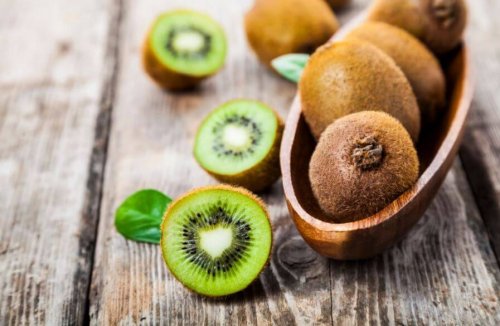Kiwis: Small Fruits with Big Benefits

Green on the inside, on the outside, kiwis are brown and fuzzy fruits. Though currently, the biggest kiwi producer in New Zealand, these fruits originally come from China. Their name stems from the physical resemblance that they share with the Oceanic Kiwi bird.
Kiwis are a fruit with two main nutrients, one of them being vitamin C. To give you an idea of how much vitamin C kiwis contain, you could consume 80 percent of your daily needs just by eating one kiwi. Vitamin C is essential for the body as it strengthens the immune system, reduces high blood pressure as well as helping to prevent cancer, allergies, and colds.
Vitamin C is a powerful antioxidant. It can neutralize free radicals, which in turn makes kiwis a great neutralizer for our bodies, especially in regard to the effects of aging. Eating this fruit will allow you to rejuvenate your cells and maintain overall health.
Properties of kiwis
- Helps prevent constipation: without question, preventing constipation is one of the main benefits of kiwis. These fruits are helpful for digestion because they have a high soluble fiber content, allowing for smoother intestinal transit. To really make the most of this attribute, try eating kiwis in the morning on an empty stomach.

- Solar protection: these fruits can help people who are sensitive to UV rays because they contain lutein, which acts as a natural filter protection for the skin.
- Reduces stress and nervousness: thanks to high vitamin C levels, kiwis can help to prevent anxiety and restlessness. As we mentioned above, these fruits reduce tension, making them a great snack in situations where we need to feel calm.
- Aids in digestion: kiwi fruits are easily digestible and help to separate the proteins from foods. In addition, the fruit helps to prevent indigestion, gastritis, and gas.
- Improves blood circulation: these fruits contain vitamin E, omega-3 and six fatty acids, which improve blood flow and the arteries in general. This helps prevent thrombus or blood clots from forming in the blood vessels.
In addition to helping prevent angina pectoris, strokes and heart attacks, the kiwi contains fiber, which helps the body to reduce cholesterol levels.
Additional benefits of eating kiwis
- Help to strengthen bones: the minerals that kiwis contain— copper, magnesium, and potassium– make this possible.
This translates into improving healthy bone growth, including teeth. It also means the nerves, muscles, and organs will function more smoothly.
- Boosts the immune system: as we mentioned at the beginning of our post, kiwis prevent the flu and colds. They help to raise the body’s defenses thanks to their high folic acid and vitamin C content.

These nutrients help the body produce more red and white blood cells as well as antibodies; the latter act as a big shield against viruses.
- Help dieters to lose weight and eliminate liquid retention: the kiwi fruit has a high water percentage, yet does not have too many calories. As a result, it helps us to lose weight and feel full. On top of that, they don’t contain too much sodium. They’re perfect for weight-loss diets and eliminating excess liquids, especially for pregnant women.
Kiwis are a diuretic and should also be included in the diets of people who are obese or overweight. They’re convenient for those who suffer from cardiac or hepatic insufficiency.
- Helps prevent anemia: as vitamin C propels many of the benefits that we’ve looked at previously on this list, it also helps to prevent anemia. It increases the body’s ability to absorb iron from everyday foods. If you’re suffering from iron-deficiency, eating a kiwi every day could help you to recover faster.
There’s no question about it! Kiwis are a food with so many health benefits for the entire body. Everyone should be including kiwis in their diets.
Green on the inside, on the outside, kiwis are brown and fuzzy fruits. Though currently, the biggest kiwi producer in New Zealand, these fruits originally come from China. Their name stems from the physical resemblance that they share with the Oceanic Kiwi bird.
Kiwis are a fruit with two main nutrients, one of them being vitamin C. To give you an idea of how much vitamin C kiwis contain, you could consume 80 percent of your daily needs just by eating one kiwi. Vitamin C is essential for the body as it strengthens the immune system, reduces high blood pressure as well as helping to prevent cancer, allergies, and colds.
Vitamin C is a powerful antioxidant. It can neutralize free radicals, which in turn makes kiwis a great neutralizer for our bodies, especially in regard to the effects of aging. Eating this fruit will allow you to rejuvenate your cells and maintain overall health.
Properties of kiwis
- Helps prevent constipation: without question, preventing constipation is one of the main benefits of kiwis. These fruits are helpful for digestion because they have a high soluble fiber content, allowing for smoother intestinal transit. To really make the most of this attribute, try eating kiwis in the morning on an empty stomach.

- Solar protection: these fruits can help people who are sensitive to UV rays because they contain lutein, which acts as a natural filter protection for the skin.
- Reduces stress and nervousness: thanks to high vitamin C levels, kiwis can help to prevent anxiety and restlessness. As we mentioned above, these fruits reduce tension, making them a great snack in situations where we need to feel calm.
- Aids in digestion: kiwi fruits are easily digestible and help to separate the proteins from foods. In addition, the fruit helps to prevent indigestion, gastritis, and gas.
- Improves blood circulation: these fruits contain vitamin E, omega-3 and six fatty acids, which improve blood flow and the arteries in general. This helps prevent thrombus or blood clots from forming in the blood vessels.
In addition to helping prevent angina pectoris, strokes and heart attacks, the kiwi contains fiber, which helps the body to reduce cholesterol levels.
Additional benefits of eating kiwis
- Help to strengthen bones: the minerals that kiwis contain— copper, magnesium, and potassium– make this possible.
This translates into improving healthy bone growth, including teeth. It also means the nerves, muscles, and organs will function more smoothly.
- Boosts the immune system: as we mentioned at the beginning of our post, kiwis prevent the flu and colds. They help to raise the body’s defenses thanks to their high folic acid and vitamin C content.

These nutrients help the body produce more red and white blood cells as well as antibodies; the latter act as a big shield against viruses.
- Help dieters to lose weight and eliminate liquid retention: the kiwi fruit has a high water percentage, yet does not have too many calories. As a result, it helps us to lose weight and feel full. On top of that, they don’t contain too much sodium. They’re perfect for weight-loss diets and eliminating excess liquids, especially for pregnant women.
Kiwis are a diuretic and should also be included in the diets of people who are obese or overweight. They’re convenient for those who suffer from cardiac or hepatic insufficiency.
- Helps prevent anemia: as vitamin C propels many of the benefits that we’ve looked at previously on this list, it also helps to prevent anemia. It increases the body’s ability to absorb iron from everyday foods. If you’re suffering from iron-deficiency, eating a kiwi every day could help you to recover faster.
There’s no question about it! Kiwis are a food with so many health benefits for the entire body. Everyone should be including kiwis in their diets.
All cited sources were thoroughly reviewed by our team to ensure their quality, reliability, currency, and validity. The bibliography of this article was considered reliable and of academic or scientific accuracy.
- Anggraini, D. I., & Luqman, V. R. (2017). Efek Buah Kiwi Terhadap Anemia Defisiensi Besi Pada Vegetarian. Jurnal Majority, 6(2), 137–143. https://juke.kedokteran.unila.ac.id/index.php/majority/article/view/1020
- López-Sobaler, Ana M., Aparicio Vizuete, Aránzazu, & Ortega Anta, Rosa María. (2016). Beneficios nutricionales y sanitarios asociados al consumo de kiwi. Nutrición Hospitalaria, 33(Supl. 4), 21-25. https://dx.doi.org/10.20960/nh.340
- Pazmiño, T., & Carolina, F. (2015). ELABORACIÓN Y APLICACIÓN DE UN LABIAL A BASE DE ACTINIDIA CHINENSIS (KIWI), GLICERINA Y FACTOR DE PROTECCIÓN SOLAR (FPS) Y SUS EFECTOS EN EL NIVEL DE HIDRATACIÓN, EN LOS ADOLESCENTES DE ENTRE 15 A 17 AÑOS QUE ASISTEN AL COLEGIO TÉCNICO AGROINDUSTRIAL “SAN PEDRO.” UNIBE.
- Richardson, D. P., Ansell, J., & Drummond, L. N. (2018). The nutritional and health attributes of kiwifruit: a review. European journal of nutrition, 57(8), 2659–2676. https://doi.org/10.1007/s00394-018-1627-z
This text is provided for informational purposes only and does not replace consultation with a professional. If in doubt, consult your specialist.








